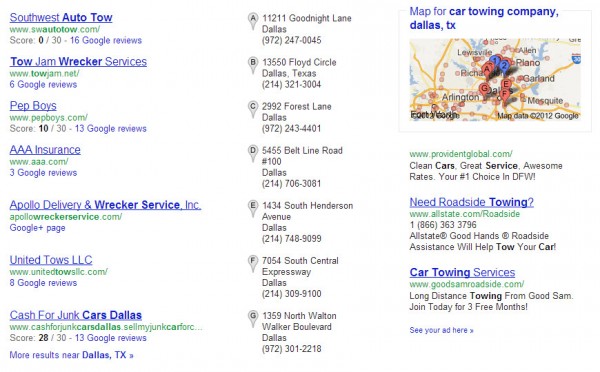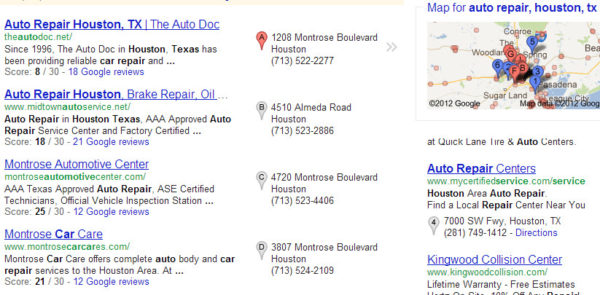Should You Count Ratings Out In Google Local Rankings?
For years now, there has been some discrepancy between statements from Google Local engineers and general optimization advice from some local search marketers where reviews and ratings are concerned. So, what’s the skinny? Rating values may simply not affect your rankings. Read on to see why. Ratings Vs. Reviews First, a quick note on terminology, […]
For years now, there has been some discrepancy between statements from Google Local engineers and general optimization advice from some local search marketers where reviews and ratings are concerned. So, what’s the skinny? Rating values may simply not affect your rankings. Read on to see why.
Ratings Vs. Reviews

A rating is usually a qualitative measure — essentially, a numerical score which a consumer selects when critiquing a business — such as on a 5-point or 10-point scale, or one to five stars, grades between “A” or “F”, or some other qualitatively measured scale between “poor” and “excellent.”
A review is typically some text one has written about a business. The two are often used in the same breath when talking about rating or reviewing businesses, and the two activities are often combined in the same process when users are encouraged to provide feedback about a business.
In this article, we’re primarily referring to the standardized rating value — on a numeric scale, 5-star rating, popcorn bags, whatever — not, the written review info.
In some cases, marketers may also refer to the value of the “quality” of reviews — that is a closely related factor to a rating, since numeric values can be derived through sentiment analysis of the review text. So, when marketers refer to the “quality of reviews,” they’re essentially talking about the same thing as a rating value.
Manipulating Ratings
There are quite a few businesses and marketing agencies that aggressively attempt to manipulate client businesses’ overall rating values — not just in Google business ratings (now adapted from star ratings into more of a Zagat-format ratings / review since their acquisition of that company), but also ratings in Yelp, YP.com, MerchantCircle, BizRate, Avvo, Better Business Bureau, etc.
Businesses seeking to manipulate consumer ratings displayed on these sites are often partly motivated by the desire to impact the rankings of businesses in local results. The annual Local Search Ranking Factors survey also reflects that some degree of top local marketers continue to consider the rating value to be a major signal.
Ratings manipulation is not motivated purely out of desire to enhance particular businesses’ ability to rank in SERPs. In some cases, malicious individuals and businesses are frequently posting shill reviews with the specific intention of damaging businesses as a sort of “negative SEO” tactic. They can’t achieve higher rankings through ethical means, so they’ll resort to attempting to tear their competitors down.
Establishing definitively whether ratings impact rankings could reduce this type of spam, so it’s worthwhile to try to figure this out and publish the findings openly. But, it’s difficult to fully suss out. The reason why many local marketers consider it to be a major ranking factor is that there is often an extremely high correlation between businesses with high rating values and rankings in Google’s local search results.
But, this factor is one of the best examples in search marketing where correlation does not equate with causation. Businesses with higher rankings also may have higher degrees of popularity as indicated through many other signals, and as they have greater numbers of customer interactions they may inspire larger amounts of consumers to rate them.
Google local engineers have consistently told me for years that ratings values are not part of the ranking algorithm. The search engineers speak definitively on relatively few signals, so this could be pretty significant.
Some top marketers have also observed that quality of reviews or ratings values may be less impactful to rankings, including Mike Blumenthal, David Mihm and others.
More importantly, there are considerable examples which appear to support the thesis that rating values are likely not affecting rankings. Here are some examples of extremely low-rated businesses ranking extremely well.
Southwest Auto Tow ranks at #1 in the local box when you search for “car towing company, dallas, tx”:
But, it has a zero overall rating value score — the lowest indicated in Google+ Local place pages:
Comparatively, the Dallas Pep Boys location ranks lower, although it has a higher rating, as well as Service King.
Similarly, a search for “auto repair, houston, tx” gives us The Auto Doc, which has a poor rating value of “8 / 30” and ranks at position #1, compared with Midtown Auto Service, Nexar Auto Repair, Montrose Automotive Center and Montrose Car Care listings — all of which have much higher rating scores:
What you may notice is, there’s something of an inverse correlation in some types of businesses which are frequently hated by their customers. So, businesses such as towing companies, divorce lawyers, car repair shops, cable companies, repossession/debt-collection companies, and government offices help to demonstrate that organizations with extremely low ratings can sometimes have the highest rankings.
Here’s a good example of this: search for “used cars, san antonio” gives us listings almost completely inversely ranked, starting with the lowest rated businesses at the top:
Based on numerous anecdotal examples like these, I believe that ratings values are not directly impacting rankings.
There are other aspects of reviews which people have theorized can affect whether ratings would be counted or not in ranking determinations. Recency, and the authoritativeness/popularity of the individual who casts the rating vote could factor in.
Written Reviews Are A Different Matter
There are aspects of written reviews, however, which are directly impactful. Keywords in reviews often lend keyword search relevancy. The numbers of reviews can be an indicator of popularity (although in some of my above examples you’ll see businesses with fewer Google reviews that are ranked higher than competitors).
Google’s patents in the past have suggested that various aspects of review text are influential under certain instances; (larger amounts of text, the authority of the reviewer) in fact, Google may have cut its eye-teeth for Author Rank (aka “Agent Rank“) determinations by first mastering assessing the authority of individual reviewers.
I’ve heard Will Scott, Matt Siltala, Arnie Kuenn and others state that also relevancy is closely involved — the “velocity” of ratings and reviews is an indicator of currentness and popularity.
Some might say that this could still affect determinations around whether ratings themselves might be relevant. I suspect that it’s definitely the case for reviews text and perhaps keywords associated with reviews text, but probably not so for ratings values themselves.
Exception Cases
In Google’s broader assessments of sites and businesses, there may be an exception that can make ratings directly affect rankings — at least, negative ratings may apparently cause a site to be suppressed or perhaps even penalized. The stink over the DecorMyEyes.com fiasco, inspired Google to implement a type of penalization against extremely bad merchants.
Considering the ratings of the tow truck companies I cited, it’s unclear just how bad ratings would have to be before they really are allowed to negatively impact ratings. I’d theorize that it’s also a factor of how respectable and trustworthy a consumer rating site’s reputation is before Google might take the negative ratings seriously enough to suppress a site’s rankings.
Perhaps this only applies in the broader keyword search results or only in Shopping Search, but it should arguably also be applied to some degree for businesses appearing in the local search results.
In some of Google’s other vertical search algorithms, rating values likely are influential. For instance, Danny Sullivan pointed out that Google is likely using merchant reviews and ratings for rankings in product/shopping search.
In addition, personalization will affect rankings, and this includes if people you are connected-to post a rating/review of a business, it can make the business appear higher in your search results. (The effect also may happen through someone who’s connected to someone else who posts the rating/review, as well as if Google determines that you’re very similar to some others who rated/reviewed a business.)
The personalization influence has been around since 2010. It should be noted, however, that this influence mainly originates from others who you are connected to; so, an account set up for the purposes of posting shill ratings is unlikely to influence rankings most people see because shill raters typically have few social connections.
Indirectly Impactful
I believe there are some ways by which ratings can be indirectly impactful to local search rankings. There are indications that clickthroughs from listings and other conversion-related activities could be factors for ranking determinations.
When a consumer clicks on a listing to view a website, to view the Google+ page, to view maps, or to obtain driving directions — these are indications that the business was selected and therefore may be highly relevant for the search query. When ratings values are displayed on listings, they affect these conversion activities and clickthrough rates; and, those activities may eventually affect the business’s rankings.
In some cases, this could further explain high correlations between rating values and rankings, just as having highly persuasive and relevant meta descriptions can affect your CTR and associated rankings over time due to the snippet text displayed with regular web search results.
Takeaways
For local search rankings — whether in the local box under Universal Search, in Google Maps search, in Google Place search results, and in Google+ Local search results — business rating values are probably not a direct ranking factor.
As such, if you’re thinking of trying to post shill reviews to improve your business’s rankings or to pull down your competitor’s rankings, this will be a waste of time. Even dramatically bad ratings appear to not impact rankings in of themselves.
And, the indirect effect ratings have on CTR and conversion activities is likely only marginally influenced by the rating value. It’s more worthwhile to simply work on being highly relevant and compelling to consumers when you appear in search (do this by engineering a good title tag for your homepage, categorizing your business properly, and having a description that influences people to choose you).
For some types of businesses, particularly service-oriented businesses like hotels and restaurants, positive ratings obviously can impact your conversion rates and the click-through signals associated with your listings. The value can impact your business more directly in those cases, and this can indirectly affect rankings over time.
For best practices, you might lightly encourage your most-pleased clients to rate and review you in various sites. (Note: any overt encouragement is against Yelp’s terms and conditions, but most other sites don’t mind your encouraging consumer reviews as long as you do not incentivize it.)
Opinions expressed in this article are those of the guest author and not necessarily Search Engine Land. Staff authors are listed here.
Related stories



